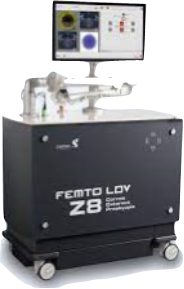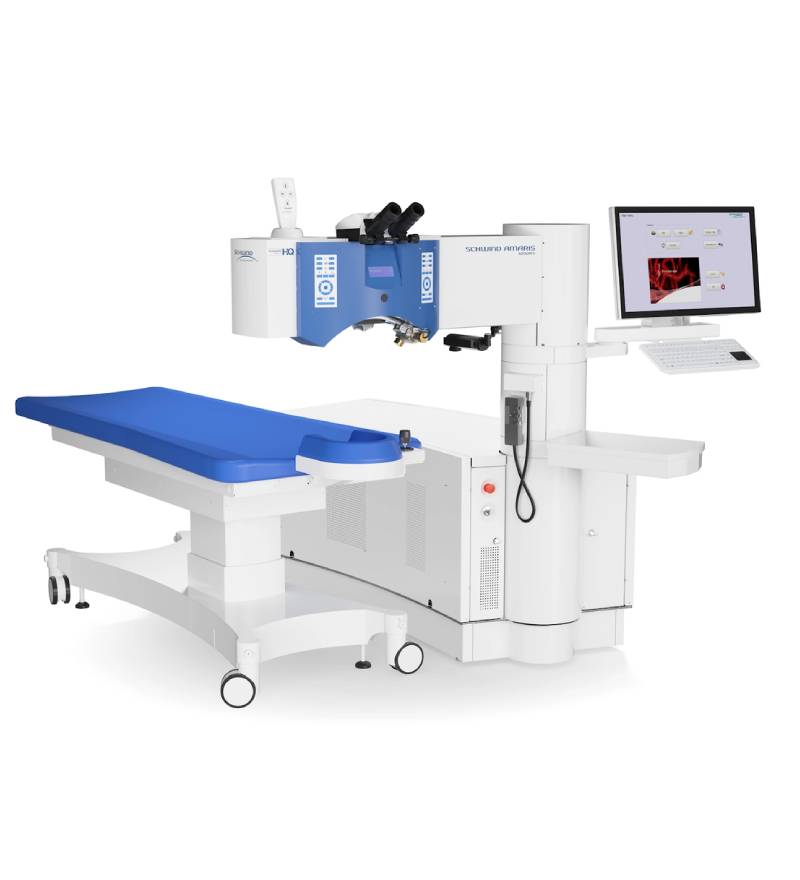Open six days a week - book a consultation with a specialist now - No Hidden Charges, No Pressure, Affordable
In Femto LASIK, the femtosecond laser (which is a type of light ) is used to create a thin, precise corneal flap without using a blade. This improves accuracy and reduces risks compared to traditional LASIK, which relies on a mechanical cutting tool called a microkeratome.
At Optimal Vision, we are dedicated to providing our patients with clear, comprehensive information about their vision correction options. In this guide, we explore the key differences between Femto LASIK and traditional LASIK - two advanced laser eye surgery procedures that have transformed millions of lives.
Both procedures aim to reshape the cornea - the transparent front surface of the eye - to correct refractive errors such as short sightedness, long sightedness, and astigmatism. The key difference lies in how the corneal flap is created. This thin layer of tissue is temporarily lifted during surgery to access and reshape the underlying corneal tissue.
Femto LASIK utilises an advanced femtosecond laser to create a precise corneal flap with exceptional accuracy. Because this technique is completely blade-less, it reduces the risks associated with traditional LASIK, which uses a microkeratome (a small cutting blade) to form the flap.
LASIK (Laser-Assisted In Situ Keratomileusis) has been a cornerstone of laser vision correction for decades. This method employs a microkeratome to create the corneal flap before an excimer laser reshapes the underlying cornea.
Both procedures offer life-changing vision correction, but choosing the right one depends on individual needs and medical recommendations. Our team at Optimal Vision is here to guide you toward the best option for your vision.
The modern day LASIK surgery that we use at Optimal Vision utilises only laser for its procedure - no blade is used. The first laser is called femtosecond and it creates a very thin flap. The second laser is called an excimer laser and it corrects your prescription, this method allows for fast recovery and predictable outcomes, allowing doctors to correct higher prescriptions.
Just like other laser vision correction surgeries, LASIK is used to reshape the cornea of the eyes. All laser eye surgeries have re-shaping the cornea as their aim in order to allow the proper focusing of light onto the retina.
Why the combination of the Schwind Amaris 1050RS and the Ziemer Femto LDV Z8 combined are your best option for LASER EYE SURGERY
The combination of the Schwind Amaris 1050RS and the Ziemer FEMTO LDV Z8 is often considered one of the best options for laser eye surgery due to their complementary strengths. Each one excels in a different critical phase of the procedure. Here’s why this pairing is seen as a top-tier choice:

This is used in the first step of LASIK, where a precise flap is created in the cornea.
Why it’s great:
This handles the actual reshaping of the cornea to correct refractive errors like myopia, hyperopia, and astigmatism.

Why it’s great:
Most patients experience some slight discomfort for 24 to 48 hours after the laser surgery. Other rare side effects include:
Exclusive LASIK eye surgery offers in London.
Call us today and enjoy the freedom with Optimal Vision
Book a consultation todayor call: 020 7183 3725
Before LASIK is scheduled, you need to visit your ophthalmologist to discuss the procedure. During the initial consultation session, your medical history will be taken, and your eyes will be assessed.
Certain tests such as measurements of the corneal thickness, refraction, eye pressure, corneal mapping and pupil dilation will be carried out. Once the test results have been accepted by the ophthalmologist, an appointment can be scheduled for the LASIK procedure.
You will be asked not to wear your gas permeable contact lenses for at least 3 weeks before an eye assessment. For other types of contact lenses, you will have to avoid them for three days before the evaluation. You should also bring your glasses to the clinic so that your ophthalmologist can review your eye prescription.
On the day of your LASIK surgery, you should not eat a heavy meal. Take a light meal and use all your prescribed medications before heading to the clinic.
Before the procedure, anaesthetic eye drops will be instilled into the eye to numb it from pain. An instrument called femtosecond laser is used during the LASIK procedure to create a very thin flap in the cornea. The flap will then be lifted so that the underlying tissue of the cornea can be reshaped using the laser. Then the flap will be repositioned for faster recovery.
You will probably feel some dryness in your eye after the procedure. Don’t worry as this is temporary. Your ophthalmologist will give you prescribed eye drops to prevent inflammation and infection, that will also moisturise your eye.
Your vision might be blurry or hazy for the first day after surgery, but your vision will improve a few days after surgery. Healing after LASIK is usually rapid.
You would be expected to visit your ophthalmologist within 24 to 48 hours after the procedure, for evaluation.
Book your eye treatment consultation with a simple click
|
Comparison |
Optimal Vision |
High street laser providers |
Hospital chains |
|
Free Consultation |
Consultant led |
Led by marketing |
Fee applies |
|
Aftercare Team |
Consultant led |
Various with no consistency |
Consultant led |
|
Duration of Aftercare |
20+ years - first year free |
Few months free |
Few months |
|
Transparent Pricing |
✔ |
X |
X |
|
Consultant Led |
✔ |
X |
✔ |
|
Medication and Eye Drops |
12 Months |
3 Months |
X |
|
Excellent Trust Pilot Rating |
✔ |
X |
X |
|
0% interest free credits |
12 Months |
X |
Variable |
|
Customised Wavefront Treatment |
✔ |
Cost Dependant |
Variable |
|
Meet Your Surgeon |
From the beginning all the way through your journey |
Day of surgery only with minimal interaction |
Partially - dependent on hospital |
***Not applicable to other promotion

Dr Mani has performed more than 35,000 ophthalmic procedures, including LASIK, LASEK, PRK, Femto Cataract, RLE, Lens ICL and Phakic IOL Surgery

We are recognised by most UK and international medical insurance providers.
Please call us to ask about private healthcare insurance.







